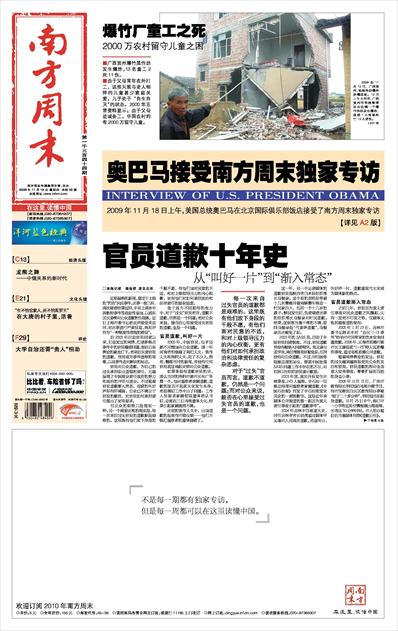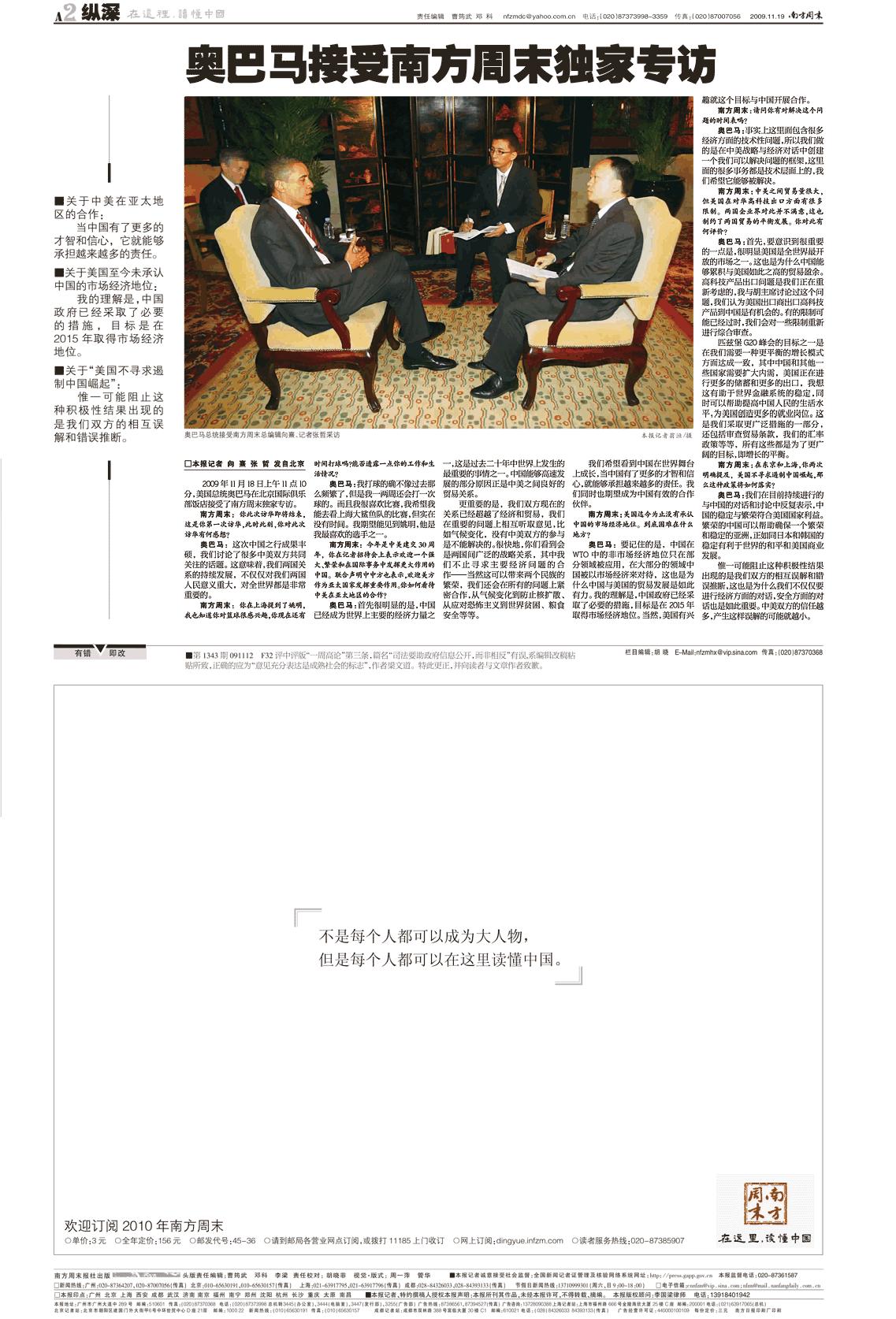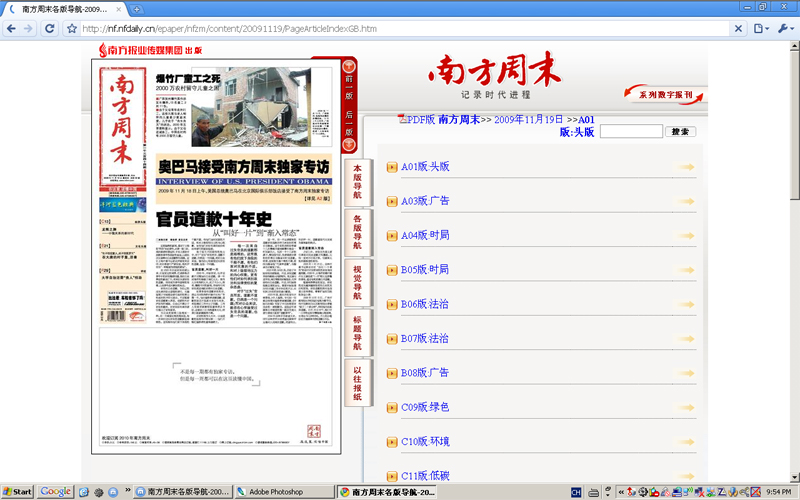-姚海鹰:《南方周末》独家专访奥巴马幕后故事
-南方周末专访欧巴马内容 延迟1天后出刊
-《南方周末》访小奥 误传被禁售
-南方周末专访欧巴马 版面开天窗抗议
-美国白宫官方网站:《南方周末》专访奥巴马(英文实录)

头版三分之一“开天窗”

A2版二分之一“开天窗”
姚海鹰·新闻墨迹:《南方周末》独家专访奥巴马幕后故事
(2009-11-19 19:44:52)
http://blog.sina.com.cn/yhy101600
(本博讯 19日北京电) 昨日,《南方周末》记者及其刚度过37岁生日的总编辑向熹,在美国大使馆的专车接送下,来到奥巴马下榻处,没有其它机构和人士的陪同,独家面对面专访了美国总统奥巴马。
事实上,在这次奥巴马万众瞩目的中国之行中,唯有《南方周末》的三名记者,向熹、毛哲及摄影记者翁洹三人,代表中国数千家媒体向美国总统发问了!
虽然整个专访只有12分钟,但却是南方周末25年生涯中一个值得载入其发展历史的时刻。
这个时刻,是南方报业曾经的掌舵人范以锦的光荣,是南方周末曾经的主编左方、江艺平和所有记者编辑的光荣,它更是中国所有坚持公正表达敢于担当责任的所有传媒的光荣。
但这个时刻,却令很多牛叉媒体怅然若失,它们在这一刻,应该汗颜,并反省。
据知情者透露,《南方周末》此次并未向美国大使馆提交采访奥巴马的申请,而是总统先生在中国外交部提供的所有官方媒体如新华社、中央电视台之外,唯独指定要求接受《南方周末》记者的采访。这是何等的牛叉!一个非官方的走市场化的媒体,在一年又一年的寒冬酷暑中,需要怎样的积累和凤凰涅槃之后,才能重生到这一步?我相信,所有中国传媒人,均心知肚明,冷暖自知。
在奥巴马看来,南方周末是中国最受公众喜爱的媒体,他认为,如果能接受该报采访,并在该报上表达自己的立场和观点,将被所有人看到,且对他自己是一份荣光。
中国社会观察人士认为,南方周末如此受到奥巴马的青睐,其表明该报虽屡受波折,但几十年来的坚持和付出,终于得到了更为广泛的世界认同,所谓种瓜得瓜,种豆得豆。天道无亲,常与善人。
据悉,有点兴奋的奥巴马居然手持《南方周末》报纸,让南方周末摄影记者拍照。谁都明白,这个陈旧老套的举动,绝不仅仅只是一个美国总统在帮中国的一份报纸担任形象代言人。虽然,我们知道,目前正逢南方周末的发行期。
我在此要真诚祝福,愿南方周末以后能越走越稳健,愿我的祖国能更加繁荣富强,愿普天下媒体人的幸福感能越来越多。
据CBN报道。
昨晚,记者致电《南方周末》总编辑向熹时,电话中传来他平静中浸透着喜悦的声音。
“其实,直到现在我也不知道奥巴马为何在中国那么多媒体中选中了我们,”向熹说,“我觉得非常荣幸。”
“但既然奥巴马选中了我们,那么,《南方周末》就要代表中国的利益去发问或求证,”向熹强调他的无比平静,同时,也感谢奥巴马给了他这样的机会。
据向熹透露,他向奥巴马提出了6个问题,双方对话12分钟,尽管时间不长,但内容非常充实。
http://blog.sina.com.cn/yhy101600
这是 Google 对 http://blog.sina.com.cn/s/blog_48a78aca0100ggvx.html 的缓存。 这是该网页在 2009年11月19日 12:27:44 GMT 的快照。 当前页在此期间可能已经更改。
奥巴马点名《南方周末》 传遭真理部干预 南周罕见“开天窗”
注:《南方周末》A2版在南方报业网站上已经被删除。
南方报业集团网站:
http://nf.nfdaily.cn/epaper/nfzm/content/20091119/PageArticleIndexGB.htm

南方周末专访欧巴马内容 延迟1天后出刊
台湾《联合报》报道:
http://udn.com/NEWS/MAINLAND/BREAKINGNEWS4/5261915.shtml
【中央社╱香港20日电】在较原定时间延迟1天后,广州市“南方周末”今天终于出刊,登载了独家专访美国总统欧巴马的内容,但截至发稿时,其网站仍未见相关消息。
广州一名读者在电话中向中央社记者表示,今早终于买到“南方周末”,报纸刊登了专访欧巴马的内容。
这位读者并质疑部分专访内容遭删除,因为估计“占全版”的专访,下半版变成为形象广告;而专访内容结尾处“似乎被中断了”。
不过,这位读者的质疑是否正确,还需要“南方周末”的证实。
另据读者传真给中央社的版面,专访内容与中央社昨天的发稿内容相同,欧巴马在访问中谈到这次访问大陆的感想、中美两国如何在亚太地区合作,以及美国为何迟迟不承认中国的市场经济地位等问题,看来并不敏感。
昨天,台湾和香港媒体都报导,欧巴马访问大陆时,选择了接受“南方周末”专访,而这次访问于18日在北京进行。
报导并指出,中共中央宣传部介入了这次事件,禁止“南方周末”在其网页上刊登专访内容;直到今早10时左右,“南方周末”的网站确实没有相关消息。
此外,报导原先预估“南方周末”于昨天出刊并发表专访内容,但结果报纸意外地延迟了1天才发行,但报纸上方印刷的日期仍是19日。
《南方周末》访小奥 误传被禁售
香港《文汇报》报道:
http://paper.wenweipo.com/2009/11/20/CH0911200002.htm
【本报北京新闻中心记者19日电】来华访问的美国总统奥巴马日前接受中国内地知名报章《南方周末》独家专访,有报道称该次专访直接通过外交渠道安排,未通过中宣部。对此,接近南方报业集团的消息人士19日接受本报询问时表示,本次专访确由美国驻华大使馆提议,由奥巴马直接点名接受《南方周末》专访,相关安排也是通过两国外交渠道进行的。
该消息人士透露,在接到相关通知后,《南方周末》总编辑向熹亲率专责国际新闻记者张哲,赶赴北京对奥巴马进行了历时10多分钟的采访。据悉,整个专访是《南方周末》总编辑向熹主问,曾有留学美国经历的张哲主要负责翻译。
采访结束后,奥巴马手拿《南方周末》报纸与采访者留影,并交换礼物。
至于坊间频传的本次专访未通过中宣部,该消息人士未直接回覆,但提供一个细节,他说,“今天一早出街的《南方周末》,刊登有奥巴马专访的一叠报纸要迟于其他叠,(有关方面)应该是看过了。”
该消息人士重申,本次专访应该是形式大于内容,《南方周末》是代表中国立场向奥巴马提问,问题符合中国国家利益。
《南方周末》是中国内地南方报业集团下的报纸,过去曾独家报道多项重大消息。昨天一度有消息称是日的《南方周末》被禁售,网上被封。但本报记者19日在羊城街头购得《南方周末》,有关的网站也能轻易登陆。
南方周末专访欧巴马 版面开天窗抗议
台湾《联合报》报道:
http://udn.com/NEWS/NATIONAL/NATS2/5261441.shtml
【联合报╱特派记者赖锦宏/西安─北京报导】 2009.11.20 05:39 am
备受瞩目的“南方周末”专访美国总统欧巴马文章,昨天为了送审,比平日晚了半天才上架面世,“南方周末”在头版及二版各留下三分之一与半个版的“空白”,刻意处理成“形象广告”,引起注意。
“南方周末”在头版三分之一版位,写下“不是每一期都有独家专访,但是每一周都可以在这里读懂中国”;在二版半版空间写下“不是每个人都可以成为大人物,但是每个人都可以在这里读懂中国”,除了这两句话,就是一片空白,仿佛刻意“开天窗”。
十八日上午,欧巴马在北京国际俱乐部饭店接受“南方周末”总编辑向熹和记者张哲的专访。据了解,在半个多小时的时间中,欧巴马谈及中美双方的外交、经济、社会和媒体等议题。不过,原先外界高度关注的独家专访,昨天见刊在南方周末报上的内容却是平淡无奇。
据了解,十八日下午,中共中宣部要求“南方周末”把写好的专访稿件送审,由中宣部常务副部长雒树刚亲自审查,随后再送外交部部长杨洁篪、中央办公厅主任、书记处书记令计划和商务部部长陈德铭等四大关,层层审核。
“南方周末”为赶在昨天能顺利出刊,编辑部全都自动加班,一直到凌晨一点,文章才被放行,并于昨天上午十点左右出报,近中午才上架,比平时整整晚了半天。
对于当局控制欧巴马专访的作法,内部人士透露,“南方周末”刻意在头版和二版都做了两大块“留白”,并在里头写下语意深长的字句,以技巧性方式,表达南方周末的立场和价值观。
据了解,南方周末刊出的专访内容和欧巴马谈话大体相符,但南方周末要以“留白”方式,抗议当初提问与刊载内容受到审查,有部分配合稿也未允许刊出,所以才有“留白”创意,提醒读者“读懂中国”。
“南方周末”自二○○七年起,就提出“在这里,读懂中国”的口号,是当年改版后的重要标志,曾固定放在报纸的最上端或最下端,但都只有短短七个字。
这次头版和二版的大篇幅留白,分别填上字句并刻意处理成“形象广告”,还是第一次。
美国白宫官方网站:《南方周末》专访奥巴马
美国白宫官方网站:
http://www.whitehouse.gov/the-press-office/interview-president-obama-xiang-xi-southern-weekly
Interview of President Obama by Xiang Xi of Southern Weekly
St. Regis Hotel, Beijing, China
Q Your first trip to China is ending. So can you use just one sentence to tell us your favorite about the trip?
PRESIDENT OBAMA: It has been a very productive trip. We have worked on a range of issues of mutual concern to the United States and China, and I think it signifies the continued growth of the relationship that is so important not only to our two peoples but also to the world.
Q I know you love basketball. So do you think you have time to play basketball while you’re being President?
PRESIDENT OBAMA: You know, I do play, not as often as I used to, but I still play maybe once every week or two. And I enjoy going to games, as well. I wish I could have gone to see the Shanghai Sharks, but it wasn’t in my schedule. And I’m looking forward to meeting Yao Ming, who is one of my favorite players.
Q 2009 is 30 years anniversary of China and U.S. diplomacy. On the press reception you said you welcome China to be a strong, prosperous country, playing a more important role on international affairs. And in the two countries’ joint declaration, China also welcomed America to play an important role as a Asia Pacific country. So how do you see the China-America cooperation in Asia Pacific area?
PRESIDENT OBAMA: Well, first of all, I think it’s obvious that China’s emergence as a major economic power in the world has been one of the most important things to happen over the last two decades. And part of the reason that China has been able to grow so rapidly is because of strong trade ties between the United States and China.
More importantly, we’re seeing our relationship move beyond just issues of trade and economics. We’re now consulting with each other on critical issues like climate change that can’t be solved unless the United States and China participate.
And so increasingly I think what you’ll see is a broad strategic relationship between the two countries in which not only are we seeking to cooperate on key economic issues that can increase prosperity for both peoples, but that we’re also working closely together on everything from climate change to nonproliferation,, to dealing with issues of terrorism, to making sure that we’re addressing critical issues like global poverty and food security.
And I welcome China’s role in the world — on the world stage. As it has more resources and more confidence, it’s able to take on more and more responsibilities. And we look forward to being an effective partner with China.
Q My fourth question is, America has not recognized China’s market economic status. So what effort you give to this question?
PRESIDENT OBAMA: Well, keep in mind that China’s non-market status under the WTO only applies to a few segments of the economy. Most of China’s economic sectors are treated as part of the market economy. That’s why trade with the United States is so robust. And my understanding is, is that the Chinese government is taking steps necessary in order for it to achieve a market status by 2015, and certainly we are interested in working with China for such a result.
Q Do you have to schedule, to work on to recognize China’s market economy status?
PRESIDENT OBAMA: Well, this is an issue that involves a lot of technical economic questions. And so what we have done through our strategic and economic dialogue is to create a framework where we can work through many of these detailed issues at a technical level — hopefully they can be resolved.
Q We notice China and America has a large content of trade, but America has many restrictions against China on high-technology exportation. Both China and America’s companies are not very satisfied on this. So it also restricts the two countries’ trade balance. How do you comment on this?
PRESIDENT OBAMA: Well, first of all, I think it’s just important to recognize obviously that the United States has the most open markets in the world. That’s why China is able to accumulate such significant trade surpluses with the United States. The issue of high-tech exports, though, is something that we are reviewing. I discussed this with President Hu. We do think there are opportunities for U.S. exporters to export high-tech technology or to export high technology to China. And some of these restrictions may be outdated, so we’re going to be doing a comprehensive review.
One of the main goals I think in the G20 summit in Pittsburgh was to agree that we need a more balanced growth pattern in which China is increasing domestic demand, and other surplus countries are increasing domestic demand, and the United States is saving more and exporting more. That I think will help to stabilize the world financial system as well as help create higher standards of living here in China and more jobs in the United States. And so this could be part of a broader approach that we need to take, and that includes looking at trade provisions, it includes what our currency policies are. All these things go into this broader goal of more balanced growth.
Q You talked twice, in Tokyo and Shanghai, that America not trying to contain China’s rise. So how do you plan to carry out this policy? How do you do it?
PRESIDENT OBAMA: Well, I think through the kinds of ongoing discussions and dialogue that we’re currently having with China. It is in the United States’ interests to have a stable and prosperous China that helps to anchor a stable and prosperous Asia in the same way that Japan’s stability, South Korea’s stability creates a more peaceful world and greater commercial ties with the United States. The same is true in respect to our policy towards China.
I think that the only thing that could prevent such a positive outcome is if there are misunderstandings and miscalculations between the two sides. And that’s why it’s so important for us to have these continuous dialogues both on the economic set of issues, but also on security issues. And the more trust that’s been established between the two countries, the less likely such misunderstandings could occur.
Q Thank you very much.
END

